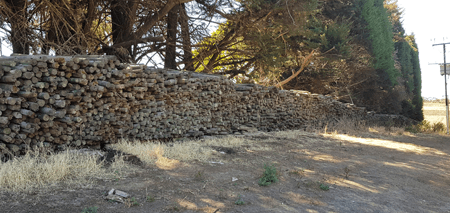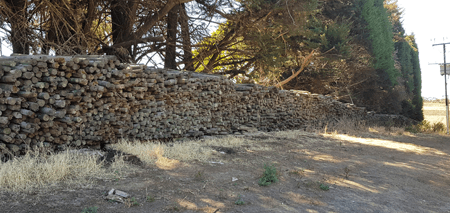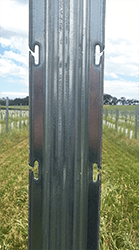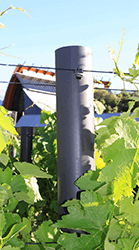
What is treated timber?
Treated timber is commonly used as a trellis for grape vines, orchards, as well as fence posts, garden furniture, structural applications, paths and boardwalks. There are a number of treated timber options, designed for different applications and differences in weather conditions, pests or fungi.
Copper chromated arsenate (CCA) timber, also called ‘permapine’ is commonly used and contains a water-based heavy metal mixture including arsenic, chromium and copper. An economically and environmentally sound disposal technology for managing large quantities of this timber once it becomes a waste is currently not available in South Australia. The Environment Protection Authority has developed a guideline that offers advice to industry on the on-site management of CCA-treated timber waste.
Why seek an alternative?
Several industries in South Australia widely use CCA timber, leading to growing quantities of treated timber waste being generated and stockpiled. Given the recent global reviews of CCA-treated timber for toxicity risk assessment and leachate generation, the EPA promotes precautionary management of waste CCA timber.
Burnt treated timber posts and treated timber ash is also highly hazardous. The heavy metals in treated timber ash present risks to ground- and surface-water quality, human and animal health, and soil quality. Accumulation of these heavy metals may make the land unsuitable for agriculture. Thousands of CCA posts were burnt in the 2020 bushfires in South Australia across over 400 properties and required careful and expensive clean up by the State and Federal Government and landholders.
Treated timber alternatives that use easily recyclable metal, or are made from recycled material, like plastic and reclaimed wood help reduce waste and support a circular economy. The more circular our economy, the more we are actively reducing our carbon footprint and our climate impact.
Replacing even a small percentage of hazardous CCA timber with more sustainable and circular alternatives would benefit the environment and the economy in South Australia.
Although these recycled posts cost more initially the whole of life cost can be less than CCA posts when factors such as hazardous handling and disposal are taken into consideration.
The real cost of CCA timber
CCA and other chemically treated posts may not last as long as more environmentally sustainable alternatives. In South Australia, the only available disposal option for CCA posts is to send to a suitably engineered and licenced landfill. The cost of sending CCA posts to landfill is an important part of considering the overall cost of ownership. This is because CCA timber is considered a hazardous material and is costly to responsibly dispose of. When the cost of transport, labour, landfill fees and handling is factored in, the overall disposal cost of CCA can be almost as high as the cost of purchasing the post.

Why are the alternatives better for the environment and the economy?
 Metal
Metal
Metal posts last much longer than timber, and metal can be recycled many times. Metal posts do not need to go to landfill, avoiding the cost of transport and gate fees. In many cases, metal retains more value and many recyclers will pay for scrap metal. Modern metal alternatives are rust and corrosion resistant and can be designed to avoid the need for clips, making maintenance easier and increasing the lifespan of posts.
 Recycled plastic and plastic/wood compositesRecycled plastic posts use 100% post-consumer and industrial wastes like saw dust and plastic we recycle through our kerbside yellow bins. This actively reuses the plastic, keeping the material part of a circular economy, while also diverting plastic from landfill and litter and into a valuable product which out performs CCA timber. Recycled plastic posts and plastic coated timber posts don't rot, splinter, or weather with age or UV radiation and are impervious to pests like termites. They are also chemically inert, which means they won’t leach chemicals into the soil.
Recycled plastic and plastic/wood compositesRecycled plastic posts use 100% post-consumer and industrial wastes like saw dust and plastic we recycle through our kerbside yellow bins. This actively reuses the plastic, keeping the material part of a circular economy, while also diverting plastic from landfill and litter and into a valuable product which out performs CCA timber. Recycled plastic posts and plastic coated timber posts don't rot, splinter, or weather with age or UV radiation and are impervious to pests like termites. They are also chemically inert, which means they won’t leach chemicals into the soil.
For suppliers of alternatives to treated timber, contact Green Industries SA.



